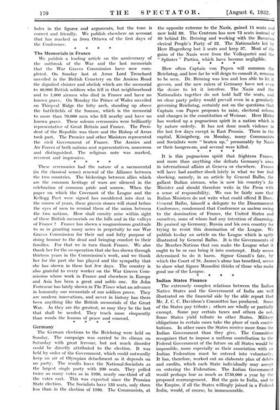These ceremonies had the nature of a sacramental (in the
classical sense) renewal of the Alliance between the two countries. The bickerings between allies which are the common heritage of wars are silenced in the celebration of common pride and sorrow. When the paper on which the Covenant of the League and the Kellogg Pact were signed has mouldered. into dust in the course of years, these graven stones will stand before the eyes of men to remind them of the union between the two nations. How shall enmity arise within sight of these British memorials on the hills and in the valleys of France ? France has shown a magnanimous gratitude to us in granting many acres in perpetuity to our War Graves Commission for their sad and lofty purpose of doing honour to the dead and bringing comfort to their families. For that we in turn thank France. We also thank her for the co-operation that she has shown through thirteen years in the Commission's work, and we thank her for the part she has played and the sympathy that she has shown in these last few days. The country is also grateful to every worker on the War Graves Com- mission whose work in France and elsewhere in Europe and Asia has been a great and noble one. Sir John Fortescue has lately shown in The Times what an advance in humanity our memorials of our soldiers prove. They are modern innovations, and never in history has there been anything like the British memorials of the Great War. As they are the greatest, so may they be the last that shall be needed. They teach more eloquently than words the lessons of peace and concord.


























 Previous page
Previous page